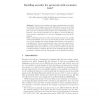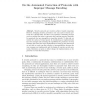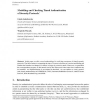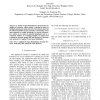155
click to vote
POST
2012
13 years 9 months ago
2012
Abstract. We formally analyze the family of entity authentication protocols defined by the ISO/IEC 9798 standard and find numerous weaknesses, both old and new, including some th...
221
Voted
CADE
2011
Springer
14 years 2 months ago
2011
Springer
Abstract. Security protocols aim at securing communications over public networks. Their design is notoriously difficult and error-prone. Formal methods have shown their usefulness ...
183
click to vote
CTRSA
2011
Springer
14 years 5 months ago
2011
Springer
Abstract. Many real-world protocols, such as SSL/TLS, SSH, IPsec, IEEE 802.11i, DNSSEC, and Kerberos, derive new keys from other keys. To be able to analyze such protocols in a com...
131
click to vote
CORR
2011
Springer
14 years 9 months ago
2011
Springer
— In recent times, many protocols have been proposed to provide security for various information and communication systems. Such protocols must be tested for their functional cor...
162
click to vote
IFIP
2009
Springer
14 years 11 months ago
2009
Springer
Security protocols are crucial to achieve trusted computing. However, designing security protocols is not easy and so security protocols are typically faulty and have to be repaire...
138
click to vote
CCS
2010
ACM
15 years 2 days ago
2010
ACM
We propose a development method for security protocols based on stepwise refinement. Our refinement strategy guides sformation of abstract security goals into protocols that are s...
105
click to vote
JCM
2007
15 years 1 months ago
2007
— This paper investigates the impact of security on the performance of WLAN. More specifically, it analyzes the impact of different implementations of encryption techniques used ...
110
click to vote
FUIN
2007
15 years 2 months ago
2007
In this paper we offer a novel methodology for verifying correctness of (timed) security protocols. The idea consists in computing the time of a correct execution of a session and ...
126
click to vote
ENTCS
2007
15 years 2 months ago
2007
Temporal logics of knowledge are useful for reasoning about situations where the knowledge of an agent or component is important, and where change in this knowledge may occur over...
123
click to vote
JSW
2008
15 years 2 months ago
2008
A notion of open bisimulation is proposed for the Applied Pi Calculus, which extends -calculus in order to facilitate analyzing security protocols. Our notion is based on the label...




